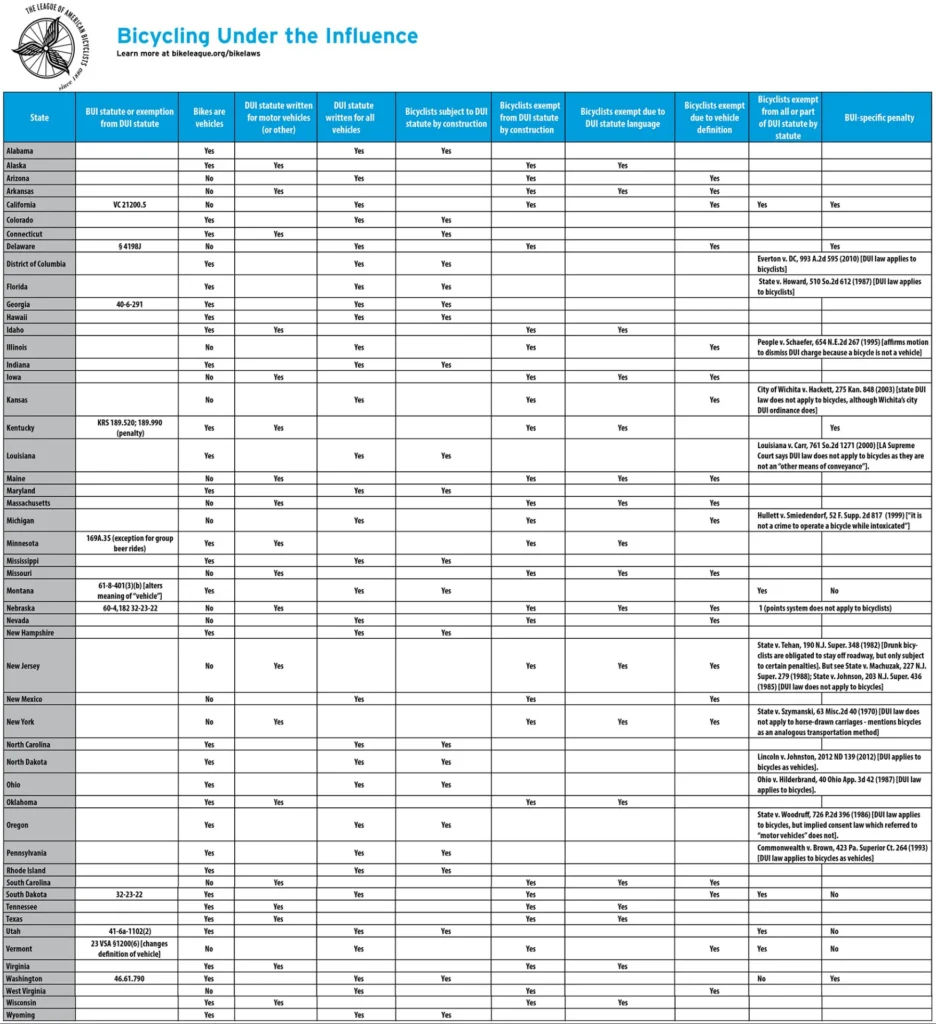Riding a bicycle, electric bicycle, or any other vehicle while under the influence can have irreversible consequences and should be avoided at all costs.
According to a study published in the U.S. Department of Health and Human Services’ journal, alcohol use by bicyclists was associated with more severe injury, greater hospital resource use, and higher mortality.
At the same time, another study conducted in Norway showed that cycling under influence is prevalent in Norway, as half of the respondents had performed CUI during the past year.
But is it actually illegal to drink and ride, and can you get a DUI on a bike or ebike?
The answer depends on where you live as states have different laws and perspectives on drinking and cycling.
In this article, we’ll explore everything you need to know about getting a DUI on a bike, and break down the individual state laws, so you can stay informed and out of trouble.
Understanding DUI Laws
Driving Under the Influence (DUI) is defined as operating a vehicle while impaired and under the influence of drugs or alcohol.
The authorities determine your ability to drive based on your blood alcohol concentration or BAC. Driving and, in some cases, cycling becomes illegal when your blood alcohol concentration (BAC) exceeds the state’s legal limit.
Most states have this set at 0.08%, though there are some states (such as Utah) with a 0.05% limit.
The permitted BAC also depends on the driver’s/rider’s age and the type of vehicle they operate, such as:
- 0.08 percent for those over 21 years of age
- 0.02 percent for those under 21
- 0.04 percent for those driving commercial vehicles
The police officer will typically ask you to perform a breath test to assess your BAC, sometimes also followed by a blood test and urine analysis.
If your BAC is above the legal limit, you will be arrested on DUI charges.
However, whether or not this will happen to you while cycling under the influence depends on how your state defines a vehicle or motor vehicle.
In general, when a state DUI law prohibits the operation of a “motor vehicle,” state courts will likely interpret that the law does not apply to bicycles. However, it may apply to electric bikes as they have an electric motor.
If the law is more general and prohibits the operation of “vehicles,” instead of “motor vehicles,” courts and judges tend to apply it to bicycles as well.
Getting a DUI on a Traditional Bike

As you can see from the guide above, getting a DUI on a traditional bike is definitely possible, so we recommend not taking any risks (and don’t even get us started on the safety issue).
Even though bicycles are human-powered and not motor-powered, cycling laws fall under the same category as automotive laws in most states.
Cyclists must follow the same laws as car drivers (with some exceptions), so it makes sense that the same DUI laws also apply.
That said, the state of New York won’t charge you with a DUI while cycling drunk as their definition of a vehicle must include a motor. On the other hand, California is one of the states that have cycling-specific DUI laws that allow the authorities to also limit your driving privileges if you are caught in the wrong.
Even if you don’t get charged with a DUI while cycling under the influence, you can still be charged with other serious offences, such as public intoxication, reckless endangerment or disorderly conduct.
These crimes can carry heavy consequences, such as probation, huge fines, and substance abuse education and/or treatment.
Can You Get a DUI on an Electric Bike?
When it comes to electric bicycles, the laws are still a bit vague, but less so compared to traditional bicycles. Since electric bikes have an electric motor, they fall under the same DUI laws as motor vehicles in many states.
Therefore, riding an ebike while under the influence can lead to similar DUI charges and penalties as when driving a car. Ebikes are more likely to be covered under DUI laws due to their motorized nature.
Some states even have specific DUI legislations for ebikes, reflecting their unique status between bicycles and motor vehicles.
Penalties for DUI on an e-bike can be pretty serious and include fines, driver’s license suspension, community service, and even imprisonment.
The severity of penalties often depends on the classification of the ebike, the specific state’s laws, and the level of the rider’s intoxication.
State-by-State Differences on DUI Laws
As we’ve already discussed above, the treatment of both traditional bicycles and electric bikes under DUI laws varies significantly on a state-by-state basis. Some states have clear laws, while others rely on broader definitions and case-by-case practices.
Related: Do You Need a License to Ride an Electric Bike?
In general, depending on where you live, you may encounter one of the four situations outlined below:
- In some states, DUI laws are limited to motor vehicles, which means they don’t apply to human-powered bicycles without a motor. However, they might apply to ebikes because they have an electric motor.
- In other states, DUI laws refer to “vehicles,” which means they can also include bicycles, as there is no mention of “motor vehicles.”
- The interpretation can also be situational. Courts and judges are known to interpret DUI laws differently when it comes to bicycles because the legislations can be vague.
- Some states, such as California, have cycling-specific DUI laws that explicitly refer to bicycles.
For a detailed breakdown of how DUI laws apply to cycling, we recommend studying Bike League’s chart below:
Alternative Charges for Cycling Under the Influence
Even if the DUI laws in your state don’t include bicycles under the “vehicle” umbrella, cyclists who ride under the influence of alcohol or drugs may still face several serious alternative charges.
Here are some common alternative charges you might risk if you cycle while impaired:
- Public Intoxication: If you are found to be visibly impaired and intoxicated in public, police may charge you with public intoxication. Common penalties include fines, community service, or short-term detention. Conviction can also lead to a criminal record.
- Disorderly Conduct: This charge includes different behaviors that disturb public peace and threaten public safety. Such behavior is common among intoxicated individuals. Possible penalties may even include jail time and result in a criminal record.
- Reckless Endangerment: Engaging in a behavior that creates a substantial risk of serious physical injury to another person is defined as reckless endangerment. If you’re intoxicated and ride in a way that puts others at risk, you may be charged with this offense.
- Open Container Violations: In case you drink while cycling, you could be charged with an open container violation. This charge is often used in conjunction with other offences mentioned above. Penalties include fines, but may add to the severity of other charges.
As you can see, even if the DUI laws in your state do not apply to bicycles and electric bikes, you could still be subject to alternative charges that result in a criminal record, affecting your future opportunities.
Risks of Cycling Under the Influence
There’s a good reason why drinking and driving or drinking and cycling is illegal—it poses a risk of serious injury or even death to both the operator of the vehicle and to other people around them.
It’s common for people to think that alcohol doesn’t impair their abilities or judgment, but it has been proven time and again that it does. Alcohol affects our abilities in both subtle and less subtle ways.
Here’s what effects different levels of BAC have on the human body and mind:
| BAC in g/dL | Effects on operating a vehicle |
|---|---|
| .02 | Reduced visual function and divided attention |
| .05 | Diminished coordination, tracking, and emergency response |
| .08 | Memory loss, slower speed control, and impaired processing |
| .10 | Impaired lane-keeping and braking |
| .15 | Severe impairment of vehicle control, attention, and information processing |
As you can see, the more alcohol you have in your blood, the more severe the effects and thus the consequences.
Alcohol typically affects our coordination, reaction time, vision, judgement, and concentration, among other things.
Here’s a more detailed outline on what effects you can expect as a cyclist if your ride your bike while intoxicated:
- Coordination: You may struggle to maintain balance, steer accurately, and perform necessary maneuvers the same way you would when not intoxicated.
- Reaction Time: You will find it difficult to respond quickly to sudden changes in traffic, such as changing traffic signals, avoiding obstacles, or unexpected actions by other road users. This can lead to accidents and collisions.
- Vision: Alcohol is known to cause blurred or double vision, which will affect your ability to judge distances, see well at night, or detect peripheral hazards.
- Judgment: Your judgment and decision-making abilities can be seriously impaired, causing you to take risks you would otherwise avoid, such as running red lights or taking unsafe routes.
- Concentration: Finally, alcohol can reduce your concentration and focus, making it hard to pay attention to the road and potentially causing you to enter a dreamlike state that could lead to an accident.
Conclusion
Cycling under the influence, whether on a traditional bicycle or an electric bike, poses significant legal and safety risks. While the legality of riding a bike while impaired varies by state, the dangers remain universal.
Alcohol and drugs impair coordination, reaction time, vision, judgment, and concentration, increasing the likelihood of accidents and injuries.
Even if DUI laws in your state do not explicitly cover bicycles, you could still face severe alternative charges such as public intoxication, disorderly conduct, or reckless endangerment.
To protect yourself and others, it’s crucial to avoid riding any vehicle under the influence and seek safer transportation alternatives instead.


Your Feedback is Important!